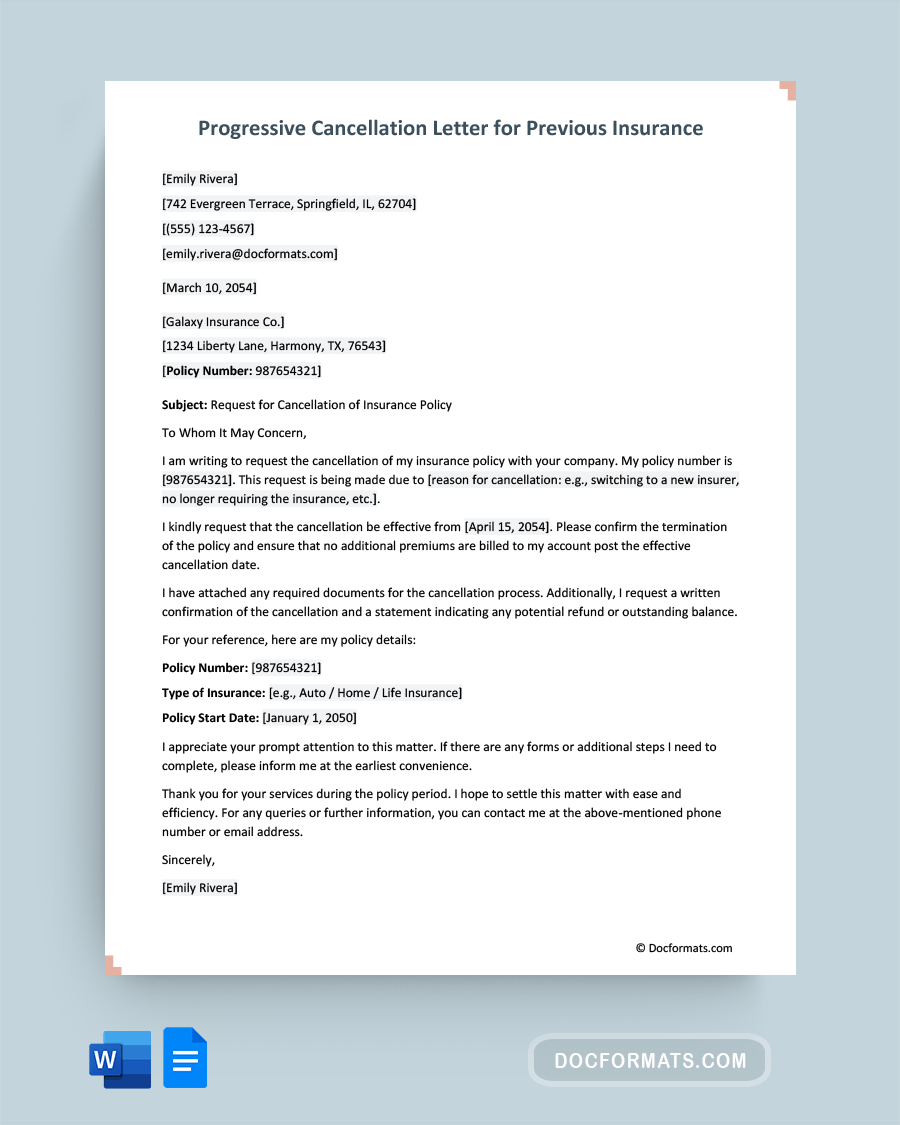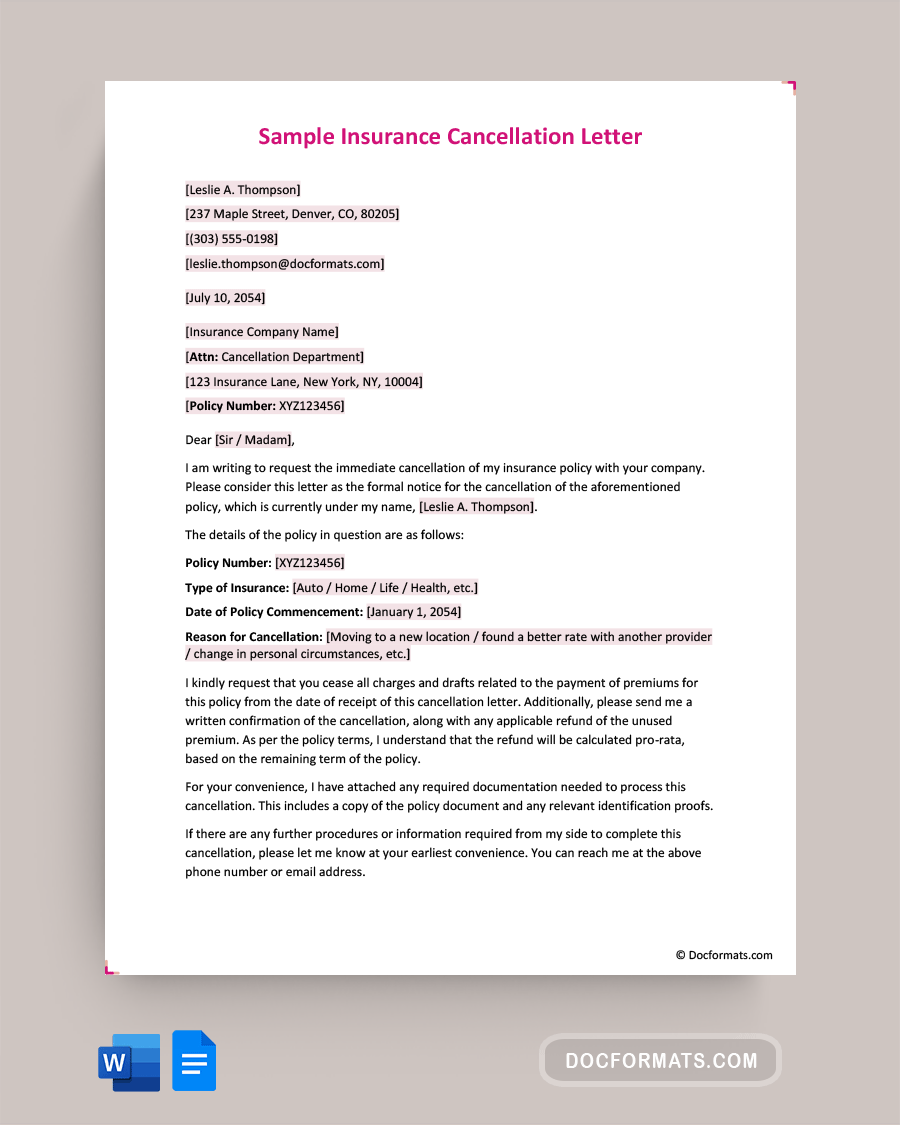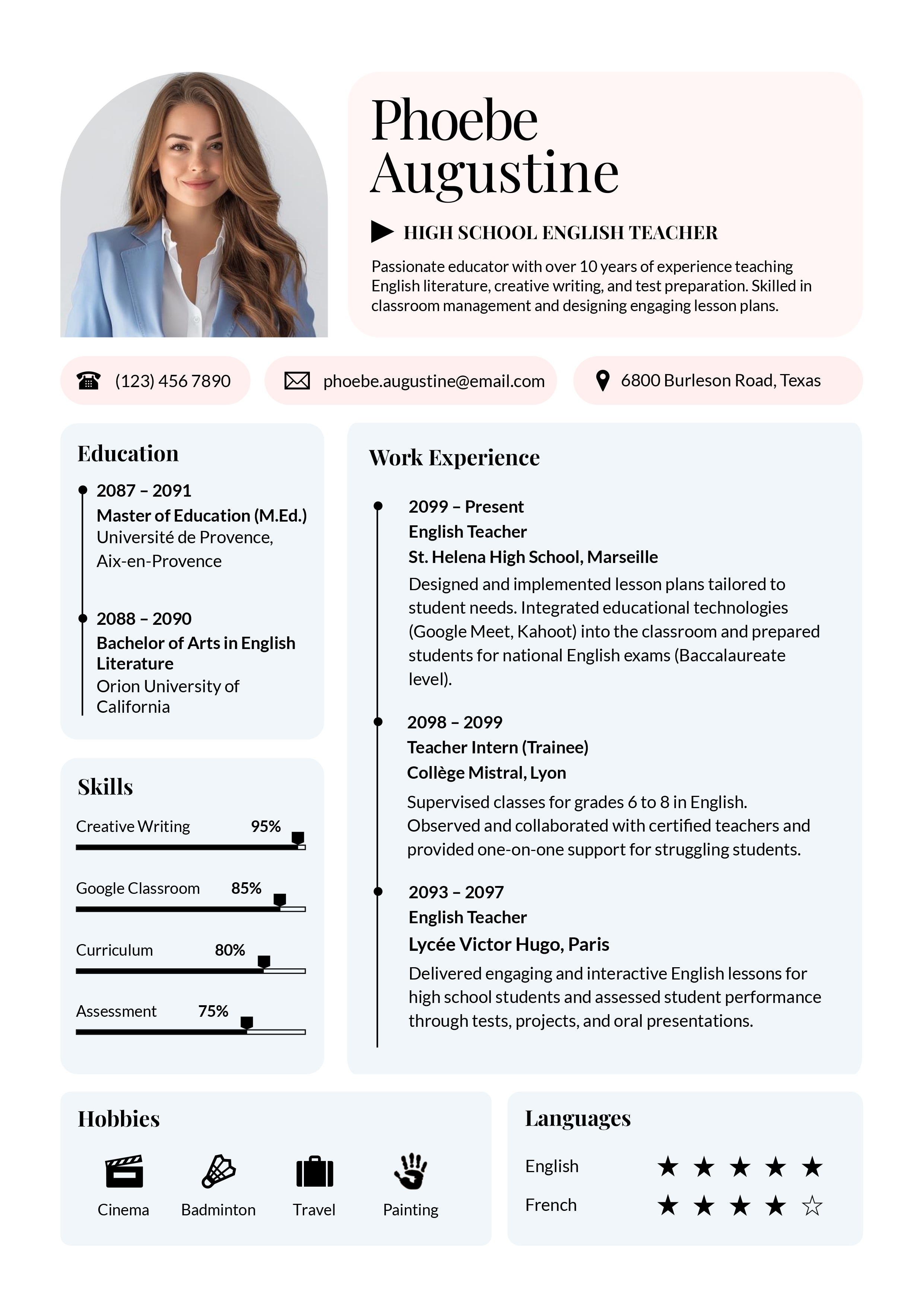An Insurance Cancellation Letter is a crucial document sent to an insurance company when a policyholder decides to discontinue their policy. This official step is necessary not just to stop premium payments but also to ensure there are no legal or financial ramifications. Common reasons for cancellation include finding a more competitive policy, changes in personal circumstances, or dissatisfaction with current services. Before drafting this letter, it’s essential to read through your policy for specific cancellation provisions, as ignoring these can lead to fees or coverage gaps. Most insurance policies outline the process for cancellation, including steps to follow and contact information for the appropriate representative. This article will guide you through crafting an effective cancellation letter, tailored to your unique policy and situation.
Insurance Cancellation Letters
Essential Elements of an Insurance Cancellation Letter
A well written insurance cancellation letter is a formal way to communicate your intent to end your policy. It’s vital to include specific details to ensure the process is smooth and clear. Here’s what your letter should contain:
- Insurance Company Details: Start with the full name of the insurance company, the department (if applicable), and the name of the contact person or representative. This ensures your letter is directed to the right individual or department.
- Your Personal and Policy Information: Clearly state your full name, as it appears on the policy, along with your policy number. Include the coverage period as listed on the declarations page of your policy. This information helps the insurer quickly identify your account.
- Effective Date of Cancellation: Specify the date from which you want your policy to be cancelled. This is important to avoid any confusion regarding the period of coverage.
- Non-Authorization of Premium Withdrawals: Include a statement clarifying that the insurer is no longer authorized to continue withdrawing premiums from your account beyond the cancellation date. This helps prevent any unwanted charges.
- Request for Premium Refund: If applicable, request a refund of any premiums that have been paid in advance for the period after the cancellation date. Be specific about the amount you expect to be refunded, if known.
- Request for Written Confirmation: Ask for a written confirmation of the cancellation to be sent to you by a specific date. This serves as proof of your policy’s termination and can be crucial for your records.
- Reason for Cancellation (Optional): While not always necessary, briefly stating your reason for cancelling can be helpful, especially if it relates to service issues or changes in your coverage needs.
- Contact Information for Follow-Up: Provide your contact details, including your phone number and email address, for any further communication needed during the cancellation process.
- Closing and Signature: End with a formal closing, such as “Sincerely,” followed by your signature and printed name.
Important: The tone of the letter should be professional and courteous, even if you’re cancelling due to dissatisfaction. Ensure the letter is clear, concise, and free of any ambiguity. Additionally, it’s advisable to send this letter via certified mail or any method that provides proof of delivery.
Insurance Cancellation Letter (Template)
[Your Full Name]
[Complete Address]
[Your Email Address] [Contact Number]
[Date]
[Insurance Company Name]
[Insurance Company Address]
Re: Request for Cancellation of Insurance Policy
Dear [Mr./Mrs./Ms. Last Name of the Contact Person or Insurance Agent],
Insured: [Your Full Name as it Appears on the Policy] Policy Number: [Your Policy Number] Policy Period: [Start Date] to [End Date of Your Coverage]
I am writing to formally request the cancellation of my insurance policy, referenced above, effective as of [Date You Wish the Cancellation to Take Effect]. From this date, I no longer authorize [Insurance Company Name] to withdraw premiums from my account [Your Account Number, if applicable].
The reason for this cancellation is [briefly state your reason for policy cancellation, if comfortable doing so].
Please process a refund for any unused premiums that may be due to me as a result of this cancellation. I request that this refund be sent to the following address: [Your Mailing Address].
Additionally, I would appreciate written confirmation of this cancellation within [specify the time frame, e.g., 30 days] of this request. This will serve as verification that my policy has been successfully terminated and that no further premium payments will be drawn from my account.
For any questions or additional information required to process this cancellation, please do not hesitate to contact me at [Your Telephone Number] or [Your Email Address].
Thank you for your prompt attention to this matter.
Sincerely,
[Your Name]
[Your Signature (if sending a physical letter)]
Sample Insurance Cancellation Letter
24 February 2031
Insured Ltd. 209 King’s Lane Philadelphia, PA 20019
Re: Cancellation of Life Insurance Policy
Dear [Contact Person’s Name or Insurance Agent],
Insured: Mary Higgins Policy Number: ILLIP/003 Policy Period: 30 January 2020 to 30 January 2035
I am writing to formally request the cancellation of my life insurance policy, as detailed above, effective 26 February 2031. Please cease any further premium payments from my account, AC 008/21, from this date forward.
I also request a detailed statement and refund of any unused premiums and the accrued cash value of my policy. Please process these refunds to the following address: [Your Mailing Address], or inform me of any additional steps needed to facilitate this transaction.
For written confirmation of this cancellation, I would appreciate it if you could send it to my email, [email protected], within the next 30 days.
If there are any forms or additional information required from my end to complete this process, please let me know at your earliest convenience.
Thank you for your prompt attention to this matter.
Sincerely,
Mary Higgins
Insurance Cancellation Letter (Word Template)

Tips for Drafting an Effective Insurance Cancellation Letter
Crafting a clear and professional insurance cancellation letter is vital for a smooth termination process. While your policy should include specific cancellation instructions, here are additional tips to ensure your letter is effective:
- Immediate Declaration of Intent: Begin your letter by stating your intention to cancel the policy. This should be clear in the first paragraph to set the right context from the outset.
- Explicit Mention of Premium Payment Termination: Clearly express your desire to cease premium payments from the effective cancellation date. This leaves no room for ambiguity regarding future payments.
- Include Essential Details: Always provide critical information such as your policy number, effective dates of your policy, and the intended date of cancellation. These details enable the insurer to easily locate and process your request.
- Brevity and Clarity: Keep the letter concise and focused. Avoid unnecessary details that might detract from the main purpose of the letter – to inform the insurer of your decision to cancel the policy.
- Typed Letters Over Handwritten: Opt for a typed letter over a handwritten one to ensure legibility and professionalism. Typed letters are easier to read and appear more formal.
- Maintain a Professional Tone: Even if you’re dissatisfied with the service, it’s important to keep a respectful and professional tone throughout the letter. This approach is more likely to ensure a smooth and efficient cancellation process.
- Proofread for Errors: Before sending, thoroughly check the letter for any spelling or grammatical errors. A well-written, error-free letter reflects your seriousness and attention to detail.
- Keep a Copy for Your Records: Always keep a copy of the letter and any related correspondence. This serves as proof of your request and can be useful if there are any disputes or delays in the cancellation process.
- Consider Sending via Certified Mail: For added security and proof of delivery, consider sending your cancellation letter via certified mail. This way, you’ll have a record that the insurer received your letter.
When is it Appropriate to Cancel an Insurance Policy?
Insurance serves as a safeguard, offering financial protection against various risks like car accidents, property damage, or health emergencies. However, the decision to cancel an insurance policy demands careful consideration, especially given the unpredictable nature of risks in today’s world.
Before proceeding with cancellation, it’s crucial to weigh the potential risks against the reasons for cancellation. Here are some common scenarios where policy cancellation might be justified:
- Seeking More Suitable Coverage: Needs evolve over time, and your current policy might no longer align with your changed circumstances. Perhaps you need more comprehensive coverage, or maybe your current policy covers risks that are no longer relevant to you.
- Financial Considerations: If you find that you’re paying significantly more than the market rate, it might be time to shop around. However, ensure that a lower price doesn’t come at the cost of essential coverage.
- Service and Claim Disputes: If you’re consistently dissatisfied with the insurer’s service, especially in handling claims, looking for a provider with a better track record might be a wise choice.
- Relocation to a New Area: Moving to a location where your current insurer doesn’t operate necessitates a policy change. This also provides an opportunity to reassess your coverage needs based on the risks specific to your new location.
In addition to these reasons, here are some critical considerations to make before cancelling:
- Check for Cancellation Fees: Some policies include cancellation fees. Make sure you’re aware of any financial penalties before proceeding.
- Understand the Timing: Cancelling mid-term might mean you’re not entitled to a full return of your premium. Consider the financial implications of your cancellation date.
- Arrange Alternative Coverage: If you’re cancelling for reasons other than no longer needing insurance (like switching providers), ensure there’s no gap in your coverage. Even a short period without insurance can be risky.
- Consult with an Expert: If you’re uncertain, it might be helpful to speak with an insurance advisor or broker. They can provide personalized advice based on your specific situation.
By thoroughly assessing your current needs, financial situation, and the quality of service you’re receiving, you can make an informed decision about whether or not to cancel your insurance policy.
Bottom Line
It’s important to remember that each insurance company has its unique procedures for handling policy cancellations. To navigate this process effectively:
- Consult with an Agent or Review Your Policy: Before initiating the cancellation, it’s essential to either speak directly with an insurance agent or thoroughly review your policy documents. This step will help you understand the specific requirements and procedures of your insurer, including any potential fees or notice periods.
- Draft a Professional and Precise Letter: When writing your Insurance Cancellation Letter, maintain a professional tone throughout. Your letter should be concise yet comprehensive, providing all the necessary details to facilitate the easy identification and processing of your policy.
- Include Key Information: Make sure to include your policy number, the effective dates of your policy, and the desired cancellation date. This will help the insurance company to quickly locate your records and process your request without unnecessary delays.
- Follow Up if Needed: After sending your cancellation letter, if you do not receive a confirmation within the expected timeframe, don’t hesitate to follow up with the company. This ensures that your request is being processed and provides peace of mind.
Remember, the goal of your letter is not just to inform the insurer of your decision to cancel but also to leave no room for misunderstanding. A well written letter sets a clear expectation for the next steps and helps ensure a smooth end to your policy.










